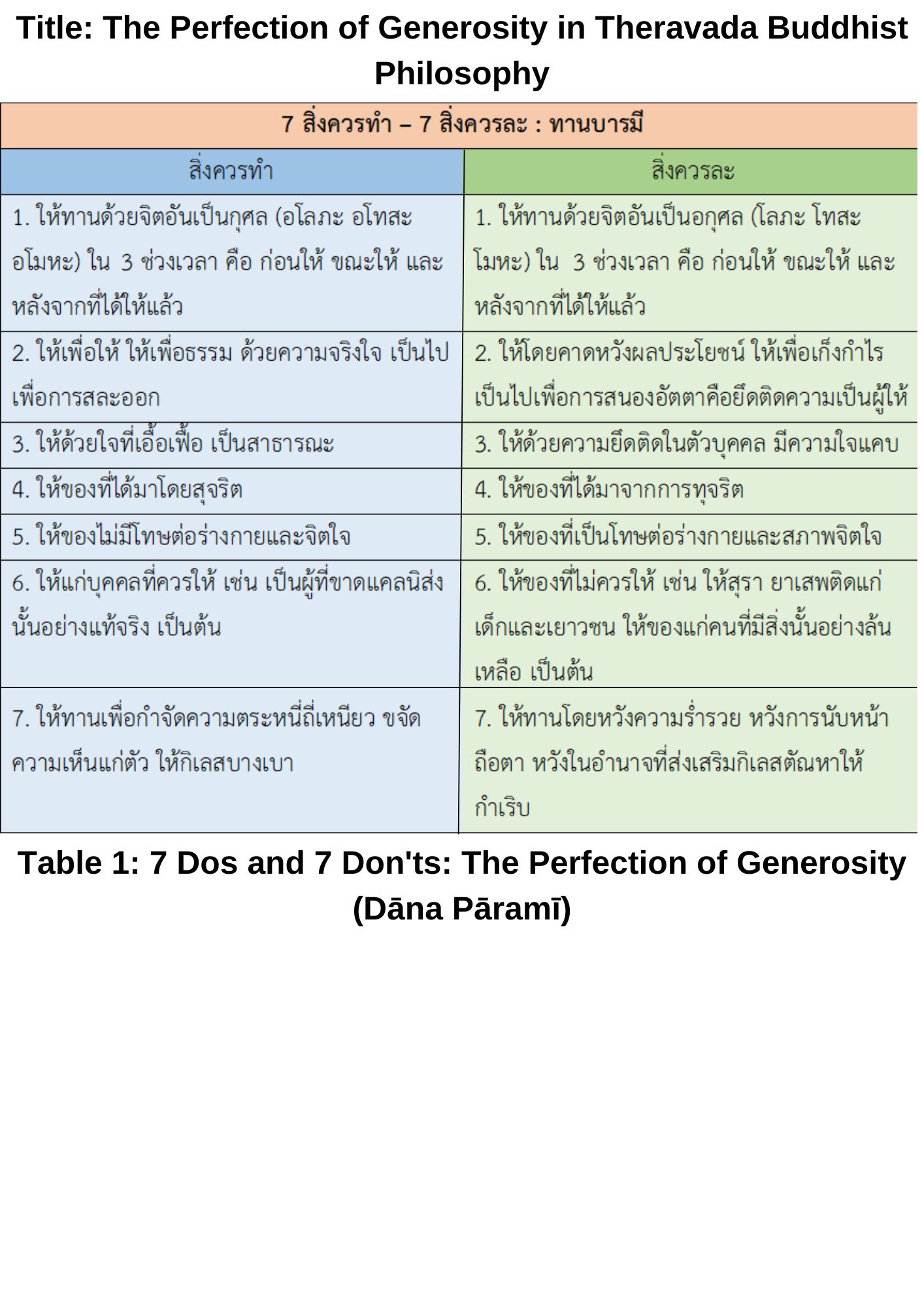The Perfection of Generosity in Theravada Buddhist Philosophy
Keywords:
Generosity, Perfection, Perfection of Generosity, Theravada Buddhist PhilosophyAbstract
This study aims to analytically examine the perfection of generosity (Dana Parami) in Theravada Buddhist philosophy. The analysis reveals that generosity, or giving, is a fundamental principle in Buddhism and significantly contributes to higher spiritual practices, ultimately leading to the cessation of suffering. The cultivation of Dana Parami can be categorized into three levels: basic, intermediate, and advanced. According to Theravada Buddhist philosophy, the types of generosity can be divided into four categories: Based on the recipient of the generosity. Based on the items given. Based on the purpose of giving. Based on the characteristics and methods of giving. Sustainable giving should be done with wisdom, aiming to relinquish the giver's defilements. It should empower the receiver to become self-reliant, fostering a balanced relationship between giver and receiver, and leading to the realization of the path to liberation from suffering. The new knowledge introduced in this study is “7 Things to Do – 7 Things to Avoid: Dana Parami,” which provides guidelines for practicing the perfection of generosity in daily life.
References
ชยพล เพชรพิมล. ทฤษฎีบารมี. วารสารศิลปากรศึกษาศาสตร์วิจัย, 7(1), 217-229.
ชวัลวิทย์ อรุณปราการ, นวลวรรณ พูลวสุพลฉัตร และสรวิชญ์ วงษ์สอาด. (2565). การใช้บารมี 10 ในการพัฒนาตนเองและสังคม. วารสารนวัตกรรมการจัดการศึกษาและการวิจัย, 4(1), 49-56.
ปัญญา สละทองตรง. (2544). มิลินทปัญหา เล่ม 2. กรุงเทพฯ : การศาสนา.
พระครูปริยัติปัญญารัตน์ (โสภรรณ ธนปญฺโญ). (2562). การศึกษาวัฒนธรรมการให้ในสังคมไทย. วารสารสังคมศาสตร์ปัญญาพัฒน์, 1(2), 17-24.
พระใบฎีกาก้องสยาม ทนฺตจิตโต (มอญไธสง). (2560). วิเคราะห์คุณค่าธรรมทานในพระพุทธศาสนาเถรวาท. ปริญญาพุทธศาสตรมหาบัณฑิต. บัณฑิตวิทยาลัย : มหาวิทยาลัยมหาจุฬาลงกรณราชวิทยาลัย.
พระมหาพงศ์ศิริ ปญฺญาวชิโร. (2564). วิเคราะห์ทานบารมีในคัมภีร์อรรถกถาชาดก. วารสารสหวิทยาการมนุษยศาสตร์และสังคมศาสตร์, 4(1), 63-73.
พระมหาโพธิวงศาจารย์ (ทองดี สุรเตโช). (2558). ธรรมสารเทศนา เล่ม 2. กรุงเทพฯ : ปัญญมิตร การพิมพ์.
พระมหาวิลาส ญาณวโร. (2508). โลนาถทีปนี. กรุงเทพฯ : จำลองศิลป์.
พระรัฐพงค์ อาจิณณธมฺโม พระครูสมุห์ธนโชติ จิรธมฺโม และทรงศักดิ์ พรมดี. (2564). ศึกษาวิเคราะห์ การบำเพ็ญทานบารมีของพระเวสสันดรในเวสสันดรชาดก. วารสารพุทธศาสตร์ศึกษา, 12(1), 175-187.
พระสาธิต รกฺขิตวํโส (เขื่อนคําแสน) และ พระอธิการสมนึก จรโณ. (2565). ศึกษาวิเคราะห์วัตถุทานในพระพุทธศาสนาเถรวาท. วารสารวิทยาลัยสงฆ์นครลำปาง, 11(2), 80-93.
พุทธทาสภิกขุ. (2555). อิทัปปัจจยตา หนังสือดี 1 ใน 100 เล่มที่คนไทยควรอ่าน. พิมพ์ครั้งที่ 2. กรุงเทพฯ : สำนักพิมพ์อรุณวิทยา.
สมเด็จพระพุทธโฆษาจารย์ (ป.อ. ปยุตฺโต). (2559). พจนานุกรมพุทธศาสน์ ฉบับประมวลศัพท์. พิมพ์ครั้งที่ 30. กรุงเทพฯ : ผลิธัมม์.
สมเด็จพระมหาสมณเจ้า กรมพระยาวิชรญาณวโรรส. (2499). ธรรมวิภาค ปริเฉทที่ 2. กรุงเทพฯ : โรงพิมพ์มหามกุฎราชวิทยาลัย.
________. (2514). บาลีไวยากรณ์ วจีวิภาค ภาคที่ 2 สมาสและตัทธิต. กรุงเทพฯ : มหามกุฎราชวิทยาลัย.

Downloads
Published
How to Cite
Issue
Section
License
Copyright (c) 2024 Institute of Sufficiency Journal

This work is licensed under a Creative Commons Attribution-NonCommercial-NoDerivatives 4.0 International License.



